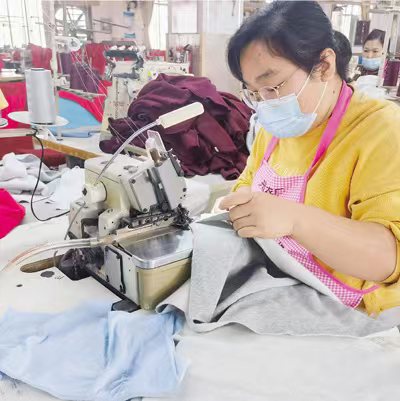A number of enterprises in south China's Guangdong Province have taken the lead in offering flexible work arrangements for female employees with children, allowing them to earn while taking care of their kids.
The province has recently drafted a document on providing more flexible job opportunities for working-age women who have children under 12, in an attempt to help them strike a balance between work and caring for children. The document made it clear that women working under this model are not allowed to do heavy manual labor or hazardous work.

A female worker sews clothes at a clothing factory in Zhongshan city, south China's Guangdong Province. (People's Daily/Hong Qiuting)
In Foshan city, over 250 enterprises in different sectors, such as e-commerce, trade, manufacturing and household services, have adopted this practice, benefiting over 3,200 working mothers.
36-year-old Wu Juanli from northwest China's Shaanxi Province runs a store with her husband in Foshan. Since the beginning of this year, the couple has faced mounting financial pressure due to poor business, which prompted Wu to find a job. She learnt that Foshan Hongyuan E-commerce Co., Ltd. offered flexible work arrangements to mothers, and, after passing the interview and training courses, she started working as a customer service representative this May, working four hours a day.
Wu works in the morning, then manages her store and picks up her child from school in the afternoon. "This really helps me a lot," said Wu with gratitude.
In April 2023, Foshan Hongyuan E-commerce Co., Ltd. launched flexible work schedules in customer service and sales in livestreaming sessions for working mothers, who must work for four and two consecutive hours respectively per day.
The company mainly sells bathroom products, and its target consumers are mostly people who have started families. The employees are about the same age as their potential clients, and can therefore better understand consumers' needs, said Zhang Mei, director of the livestream selling business of the company.
Zhang added that most mothers working under this model show a greater sense of belonging and loyalty. Most of them cherish this work opportunity and have a more positive work attitude. "Launching this flexible model for mothers is a good choice for the company's long-term development," said Zhang. Today, there are over 30 employees working under this model, and about five of them perform better than some full-time workers, and are expected to work full-time in the future.
Similarly, Zou Yuefeng based in Qingyuan city used to take care of her two children and elderly family members at home, before she was offered a job by TIME Aluminum. The 45-year-old now carries out tasks related to packaging.
From the perspective of Lei Xiaohong, the company's deputy general manager, this approach does not increase the burden for enterprises, but brings win-win results.
"Quite a few employers see this practice as some kind of sacrifice, and worry that it means higher costs for the company. Our company weighed up its pros and cons before implementing this measure," said Lei. "But so far, those who work under this model have shown a greater sense of belonging and loyalty, and even have higher work efficiency. So at the end of the day, it is the company that benefits from it," Lei added, who also revealed that the company will continue to offer more posts under this model in the future.
Qingyuan city has ramped up efforts to expand this working model. "Since the inception of this new model, the Women's Federation of Yuantan township in the city has had extensive contact with women who had difficulty finding jobs. We also visited enterprises to learn about their demands. Then with the help of some favorable policies, we established a service platform for free to allow interaction between both sides," said Zeng Lijuan, vice president of the federation. Zeng went on to explain that a number of enterprises and mothers have contacted her for more details.
Furthermore, a WeChat mini program named "Posts for Mothers of Qingyuan" went online on May 15. More than 110 enterprises and individual businesses in sectors including agriculture, textile, garment industry, manufacturing, housekeeping, e-commerce livestreaming, tourism, hotel and handicraft published 598 job openings on it. Zeng is confident that the WeChat mini program will attract more enterprises and jobseekers.
In Zhongshan city, over 160 companies have joined this trend, offering more than 4,000 positions, and the number is still expanding. In an audio and sound equipment factory in Gangkou township, there are 236 such workers, accounting for about one third of the total staff on the production line. Huang Chunhua, 29, for example, mainly attaches tags to products at the factory, earning a monthly income of about 4,000 yuan (about $565.61).
Xie Xiaoling, who also works under this model in Zhongshan, said, "I'm very satisfied with my job, as it allows me to realize my self-worth, gain professional skills, and have enough time to take care of my children."
Different parts of the country have also taken similar steps. Some pharmaceutical factories in Xiajiang county, east China's Jiangxi Province inaugurated a production line specifically for female employees with children. Clothing enterprises in Chongren county in Jiangxi set up sewing workshops to provide job opportunities for working mothers.
To better conform to the trend of flexible work, more employment services, including employment guidance and recommendation, should be provided, suggested Luo Mingzhong, a professor at the College of Economics and Management of South China Agricultural University in Guangzhou, capital of Guangdong.